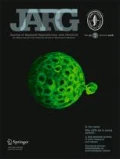Abstract
Purpose
Researchers have hypothesized that an imbalance of immune cells in the uterine decidua and a dysfunction in cytokines they produce may contribute to recurrent pregnancy loss (RPL). The objective of this study was to determine if IL-22, IL-23 and IL-17 are expressed abnormally in the decidua of patients with RPL compared to those women with a normal pregnancy. We also sought to confirm that uterine natural killer (uNK) cells are lower in the decidua of patients with RPL, as well as identify IL-22 expression by uNK cells.
Methods
After meeting strict inclusion criteria, maternal decidua of nine patients with unexplained RPL and a confirmed euploid fetal loss, and 11 gestational age-matched patients undergoing elective pregnancy termination were included in our analysis. Quantitative real time-polymerase chain reaction (qRT-PCR) was performed to quantify RNA expression, Western blot was performed to quantify protein expression and immunohistochemistry (IHC) was performed to identify IL-22 and uNK cells.
Results
We found that women with unexplained RPL and a euploid fetal loss had significantly less gene and protein expression of IL-22 in the decidua. Additionally, we found that IL-22 is primarily expressed by uNK cells in the decidua.
Conclusions
In conclusion, our results suggest that lower levels of IL-22 in the uterine decidua in patients with unexplained RPL may contribute to a disruption of decidual homeostasis and ultimately lead to early pregnancy loss.




Similar content being viewed by others
References
Jacobs PA, Hassold T. Chromosome abnormalities: origin and etiology in abortions and live births. In: Vogel F, Sperling K, editors. Human genetics. Berlin: Springer; 1987. p. 233–44.
Warburton D, Fraser FC. Spontaneous abortion risk in man: data from reproductive histories collected in a medical genetics unit. Am J Hum Genet. 1964;116:1–25.
Stirrat GM. Recurrent miscarriage. Lancet. 1990;336:673–5.
Suguira-Ogasawara M, Ozaki Y, Katano K, Suzumori N, Kitaori T, Mizutani E. Abnormal embryonic karyotype is the most frequent cause of miscarriage. Hum Reprod. 2012;8:2297–303.
Quack KC, Vassiliadou N, Pudney J, Anderson DJ, Hill JA. Leukocyte activation in the decidua of chromosomally normal and abnormal fetuses from women with recurrent abortion. Hum Reprod. 2001;16:949–55.
Wang S, Li YP, Ding B, Zhao YR, Chen ZJ, Xu CY, et al. Recurrent miscarriage is associated with a decline of decidual natural killer cells expressing killer cell immunoglobulin-like receptors specific for human leukocyte antigen C. J Obstet Gynaecol Res. 2014;40:1288–95.
Yamamoto T, Takahashi Y, Kase N, Mori H. Decidual natural killer cells in recurrent spontaneous abortion with normal chromosomal content. Am J Reprod Immunol. 1999;41:337–42.
Liu YS, Wu L, Tong XH, Wu LM, He GP, Zhou GX, et al. Study on relationship between Th17 cells and unexplained recurrent spontaneous abortion. Am J Reprod Immunol. 2011;65:503–11.
Wang WJ, Hao CF, Lin Y, Yin GJ, Bao SH, Qiu LH, et al. Increased prevalence of T helper 17 (Th17) cells in peripheral blood and decidua in unexplained recurrent spontaneous abortion patients. J Reprod Immunol. 2010;84:164–70.
Sabat R, Ouyang W, Wolk K. Therapeutic opportunites of the IL-22-IL-22R1 system. Nat Rev. 2014;13:21–38.
Wolk K, Kunz S, Witte E, Friedrich M, Asadullah K, Sabat R. IL-22 increases the innate immunity of tissues. Immunity. 2004;21:241–51.
Wang Y, Xu B, Li MQ, Li DJ, Jin LP. IL-22 secreted by decidual stromal cells and NK cells promotes the survival of human trophoblasts. Int J Clin Exp Pathol. 2013;6:1781–90.
Croxford A, Mair F, Becher B. IL-23: one cytokine in control of autoimmunity. Eur J Immunol. 2012;42:2263–73.
Dumoutier L, Louahed J, Renauld JC. Cloning and characterization of IL-10-related T cell-derived inducible factor (IL-TIF), a novel cytokine structurally related to IL-10 and inducible by IL-9. J Immunol. 2000;164:1814–9.
Male V, Hughes T, McClory S, Colucci F, Caligiur M, Moffett A. Immature NK cells, capable of producing IL-22, are present in human uterine mucosa. J Immunol. 2010;185:3913–8.
The Practice Committee of the American Society of Reproductive Medicine. Evaluation and treatment of recurrent pregnancy loss: a committee opinion. Fertil Steril. 2012;98:1103–11.
Cella M, Fuchs A, Vermi W, Facchetti F, Otero K, Lennerz JKM, et al. A human natural killer cell subset provides an innate source of IL-22 for mucosal immunity. Nature. 2009;457:722–5.
Hanash AM, Dudakov JA, Hua G, O’Connor MH, Young LF, Singer NV, et al. Interleukin-22 protects intestinal stem cells from immune-mediated tissue damage and regulates sensitivity to graft versus host disease. Immunity. 2012;37(2):339–50.
Zenewicz LA, Yancopoulos GD, Valenzuela DM, Murphy AJ, Stevens S, Flavell RA. Innate and adaptive interleukin-22 protects mice from inflammatory bowel disease. Immunity. 2008;29(6):947–57.
Acknowledgments
This research was made possible through the support of the Ernest and Amelia Gallo Endowed Postdoctoral fellowship, the Child Health Research Institute, Lucile Packard Foundation for Children’s Health, as well as the Stanford CTSA (grant number UL1 TR000093).
Conflict of interest
There are no known conflicts of interest associated with this publication.
Author information
Authors and Affiliations
Corresponding author
Additional information
Capsule In patients with unexplained RPL and a euploid fetal loss, lower levels of IL-22 in the decidua may contribute to alterations in decidual homeostasis and play a role in early pregnancy loss.
Rights and permissions
About this article
Cite this article
Perfetto, C.O., Fan, X., Dahl, S. et al. Expression of interleukin-22 in decidua of patients with early pregnancy and unexplained recurrent pregnancy loss. J Assist Reprod Genet 32, 977–984 (2015). https://doi.org/10.1007/s10815-015-0481-7
Received:
Accepted:
Published:
Issue Date:
DOI: https://doi.org/10.1007/s10815-015-0481-7



